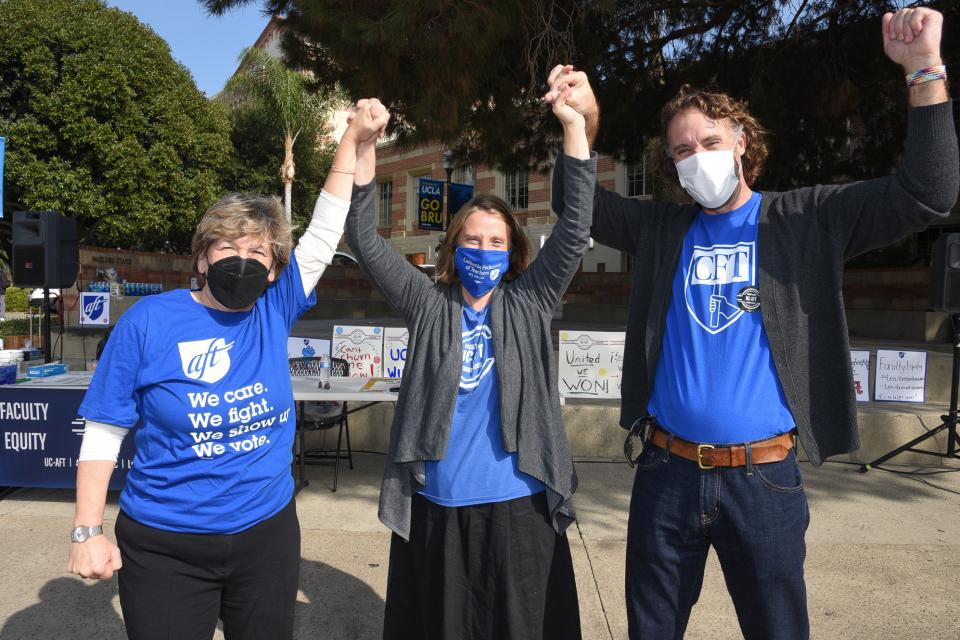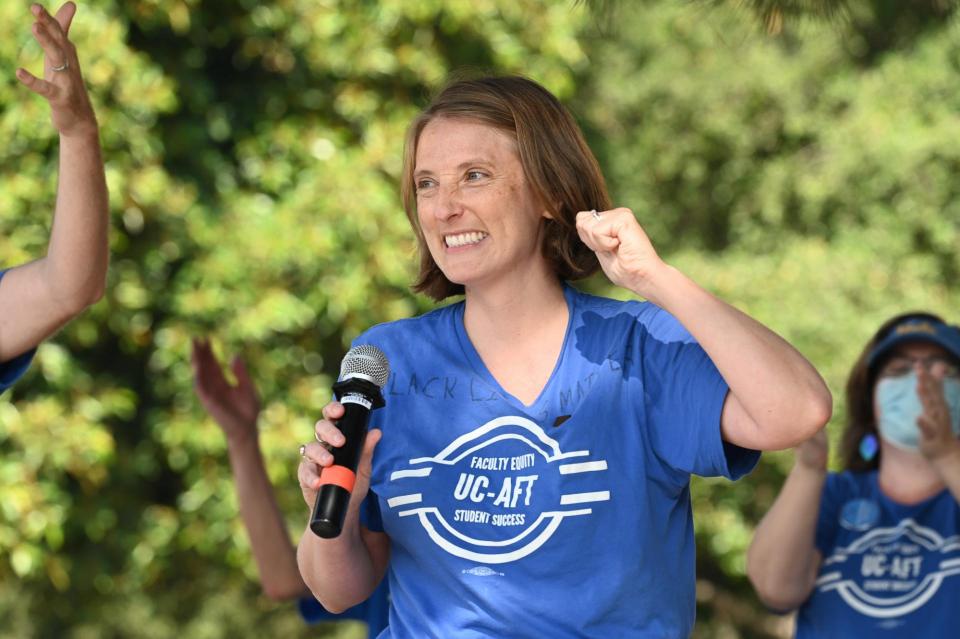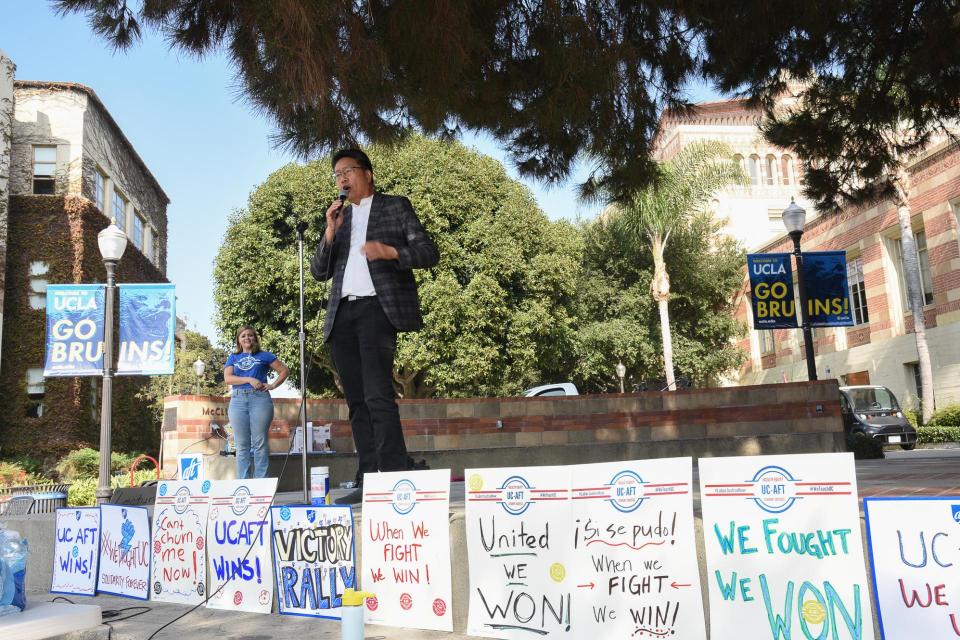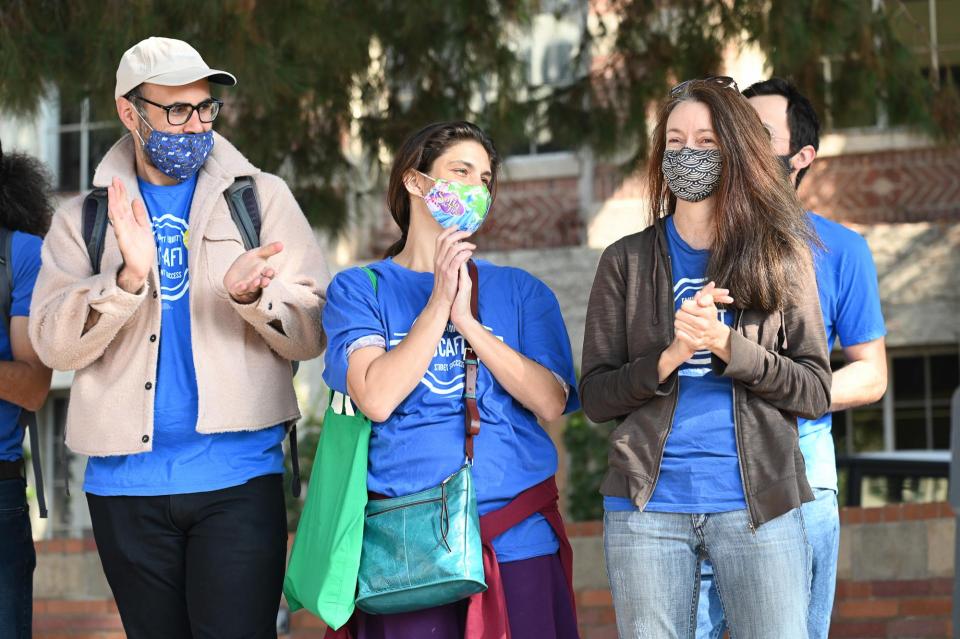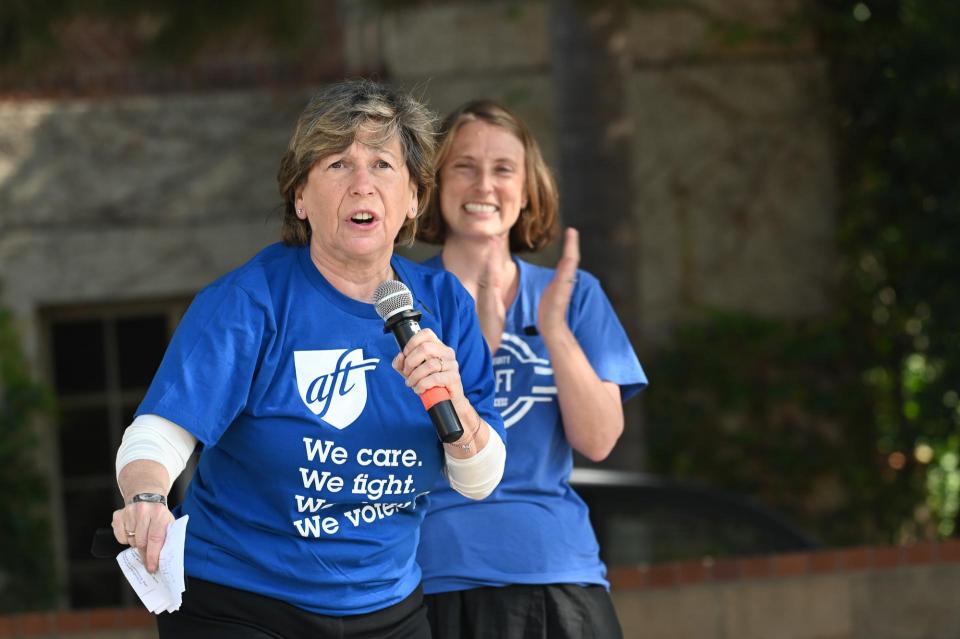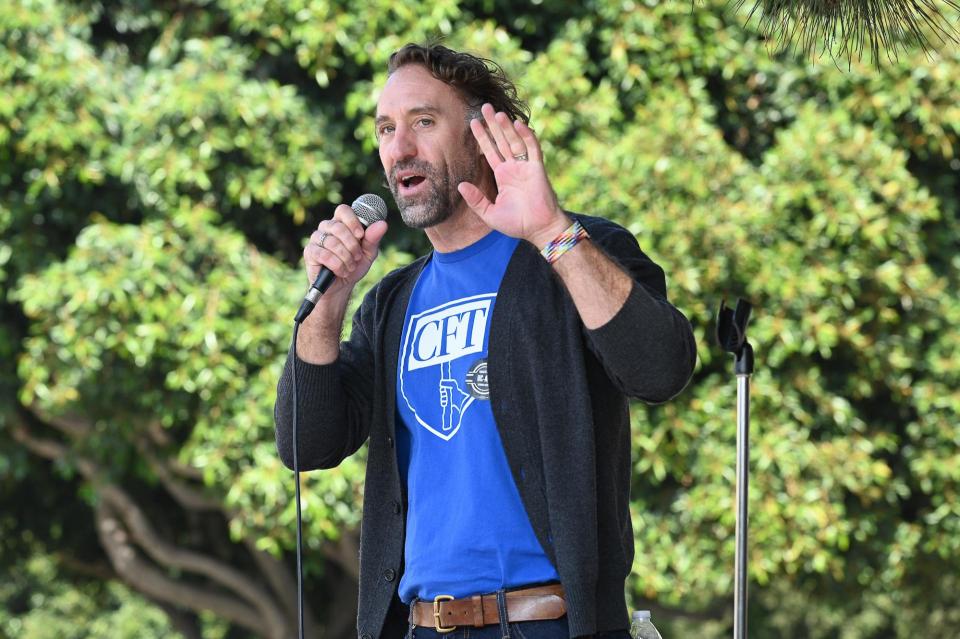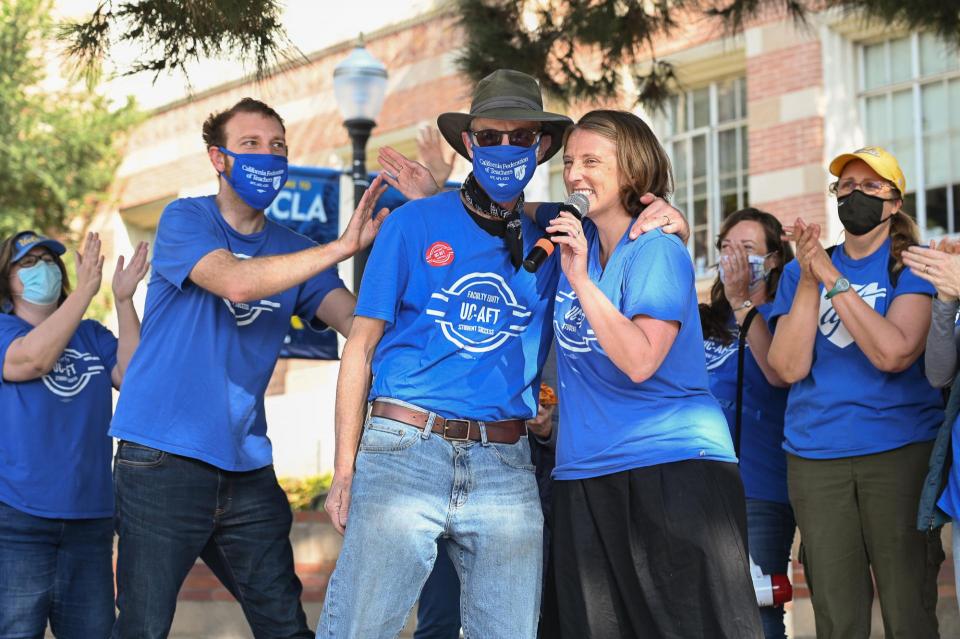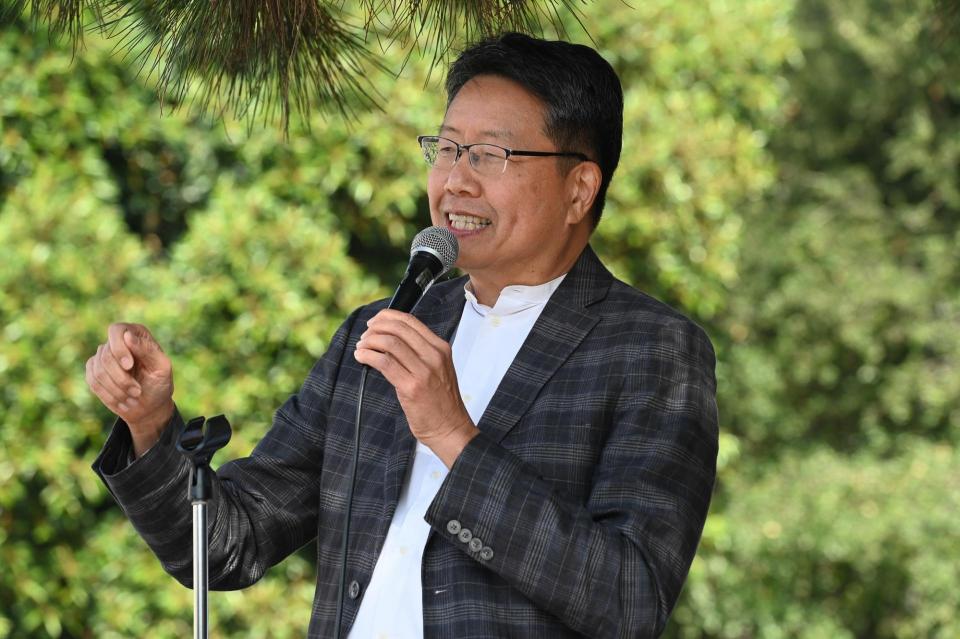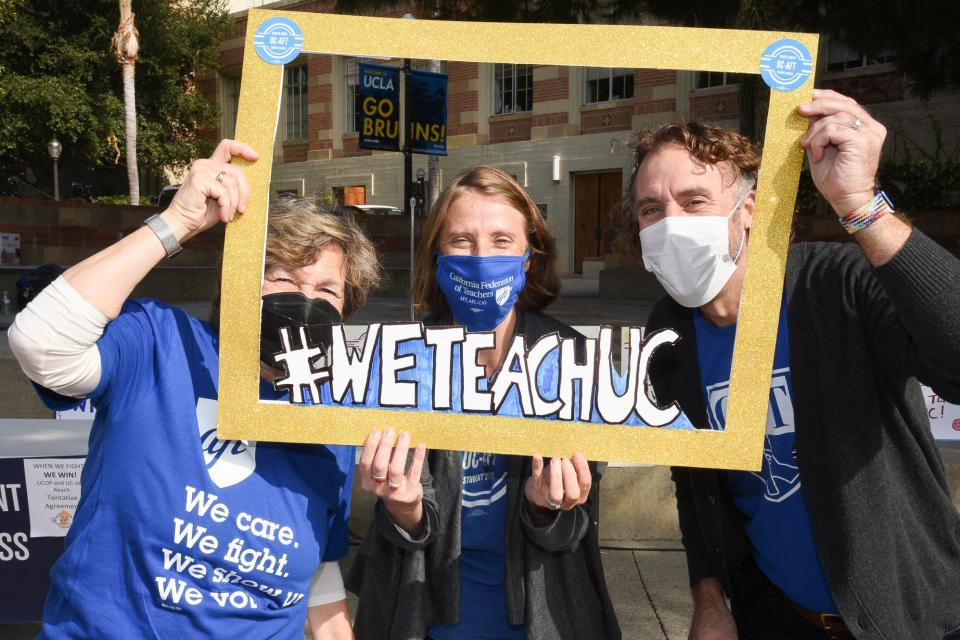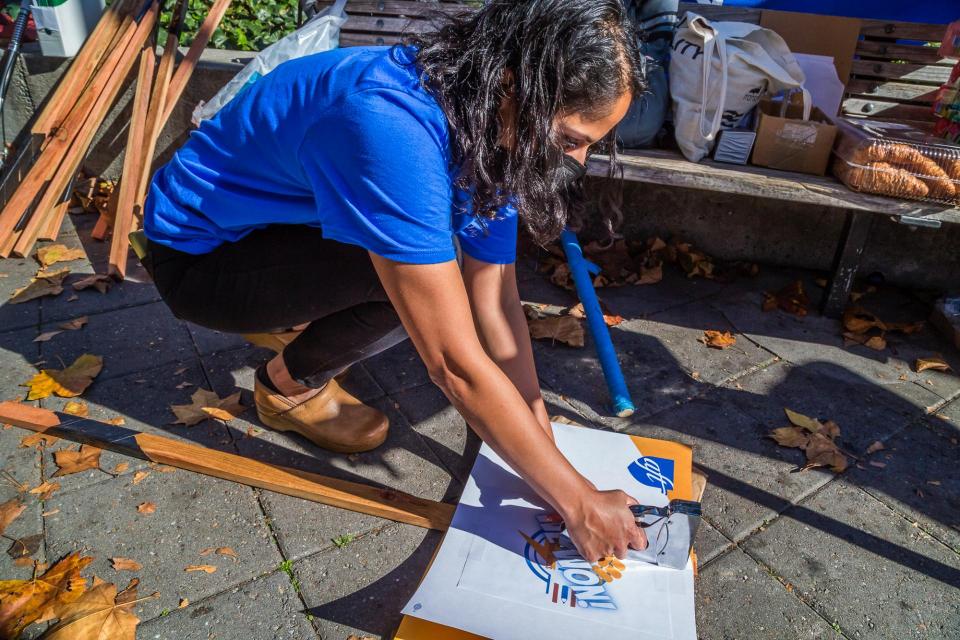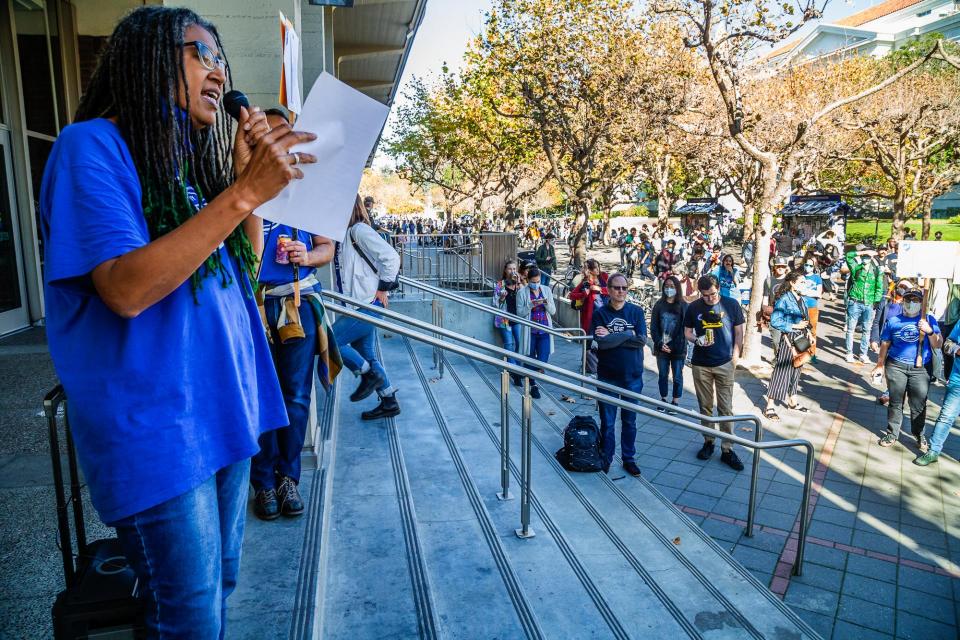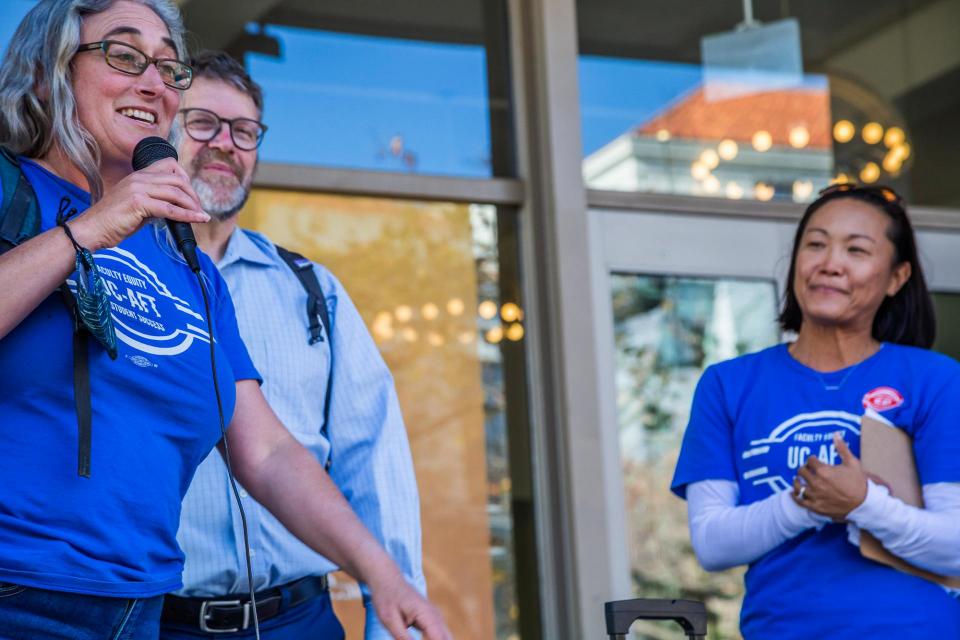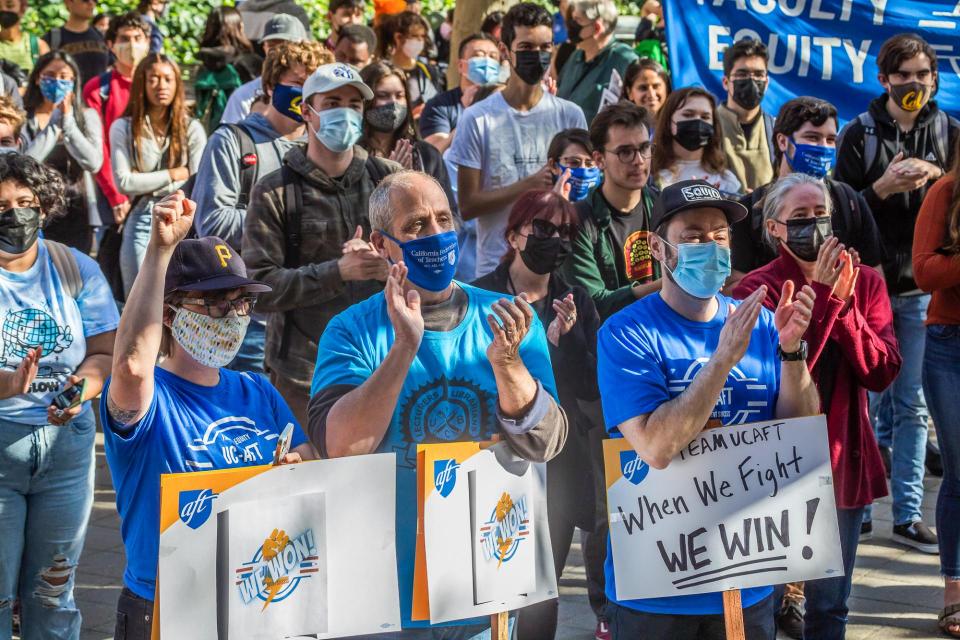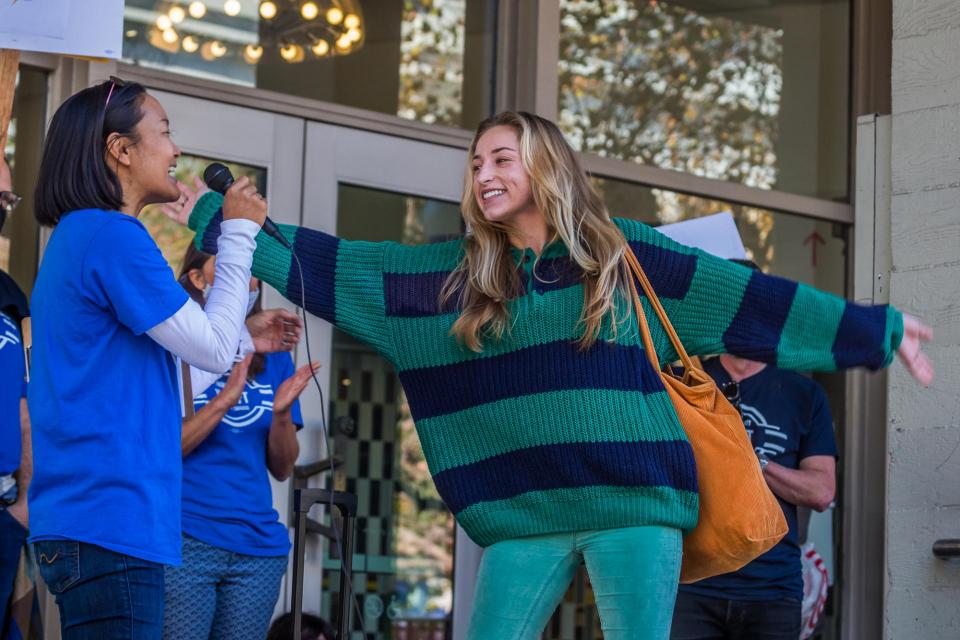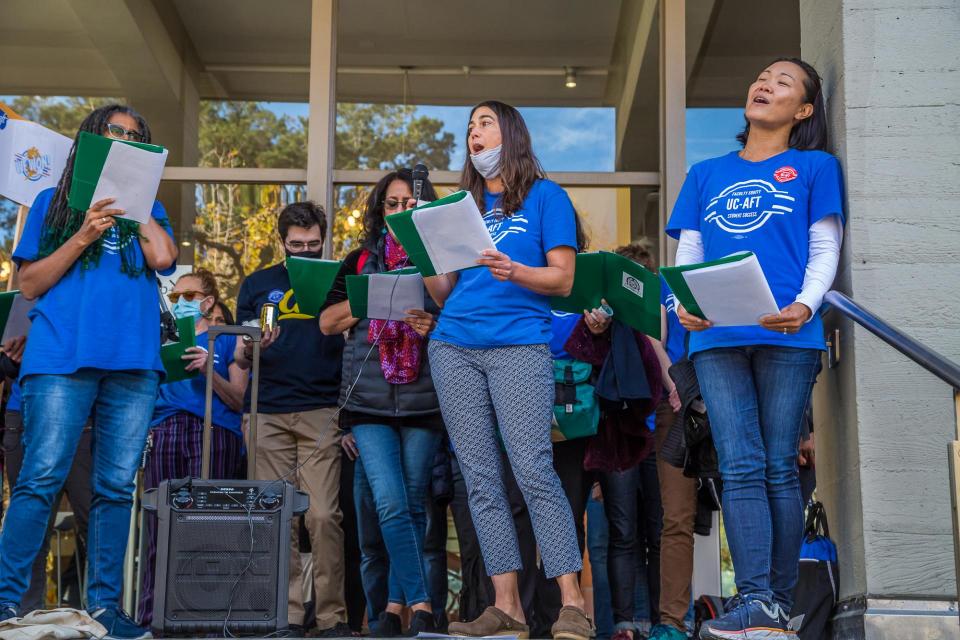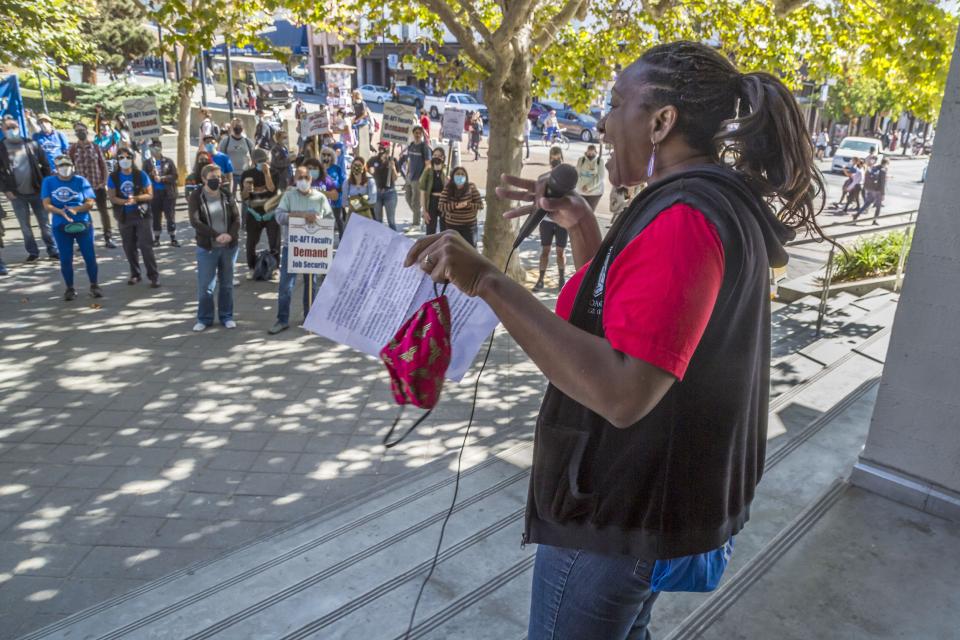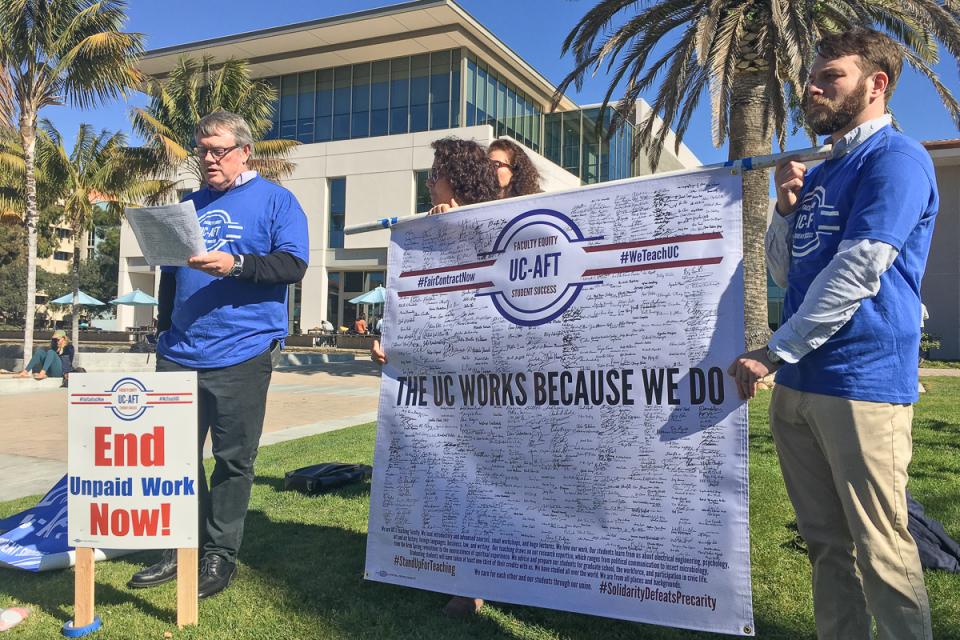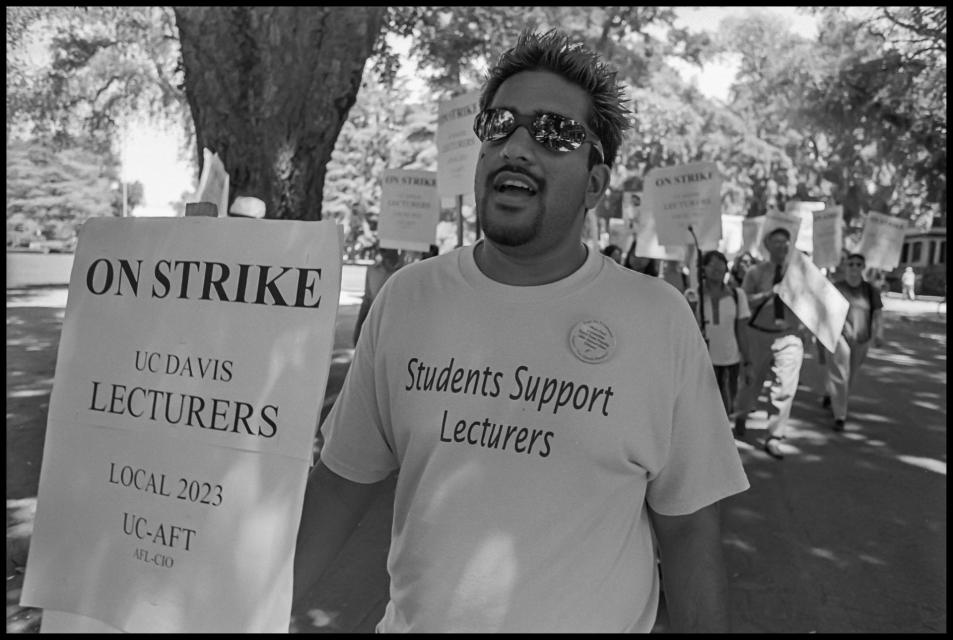The view from Westwood
UCLA — It was about 3 a.m., UC-AFT President Mia McIver recalled, when negotiators for the University of California texted the administration’s “final offer.” McIver knew that all major contract issues, from job security to salary increases, were settled. She also knew that 6,500 lecturers were set to strike at all nine UC campuses in a few hours.
But McIver just couldn’t let it go. She responded that the union would accept the offer if a $1,000 signing bonus was raised to $1,500. There was a wait, and then a response from management’s lead negotiator at 3:37 a.m.
The administration agreed, adding more than $3 million to a tentative agreement that ended more than two years of bad faith bargaining by UC.
“What changed is that we were really going to go on strike, and they understood how angry our members were,” McIver said a few hours later at a noon victory celebration on UCLA’s Bruin Walk.
“I wanted you all to feel the taste of victory in your mouths,” she told cheering lecturers and supporters.
The groundbreaking tentative agreement includes job security protections that create opportunities for professional advancement for lecturers at every stage of their careers, greater transparency and enforceability of workload issues, improved compensation with an average of 30% pay increases across the life of the contract, and four weeks of fully paid family leave to bond with a new child or care for ailing family members.
How close were lecturers to walking on picket lines? Before setting off for the marathon bargaining session, CFT President Jeff Freitas laid out two shirts for the morning: a red one for striking, and a blue one for celebrating.
“I was ready for the red, but I’m so much happier to wear the blue,” Freitas said.
Behind him, Caroline Luce whipped up the UC-AFT activists and supporters.
“We saved a whole lot of people’s jobs today,” said Luce, a lecturer in the Labor Studies department, “and we gave every job a career ladder.”
The cheers grew louder as Luce, also a member of the UC-AFT communications team, listed enforceable workloads, paid family leave, and other contract breakthroughs. Applause broke out when she thanked the California Nurses Association and other unions on campus for their support during years of organizing and bargaining.
AFT President Randi Weingarten said the historic contract will inspire contingent faculty’s fight for dignity and justice.
“Everywhere across the country, adjuncts and lecturers are carrying the load in higher education,” Weingarten said, even though universities keep lecturers in continuing, precarious economic uncertainty.
“How do you raise a family like that? How would you like a career like that?” she said. “We call it ‘precarity’ and today you have hit it hard,”
CFT Vice President Kent Wong said the lecturers’ contract sets a positive tone as UC begins negotiations with the Teamsters, clerical staff, and student researchers who recently filed for recognition.
Wong, who also directs the UCLA Labor Center, said employers in all sectors of the economy are splitting workers into tiers in order to lower wages and benefits. And labor is fighting back.
UC negotiators couldn’t help but notice the outcome of two major contract talks in Southern California. Kaiser Permanente dropped its demand for a two-tier system the previous day, hours before more than 20,000 healthcare workers were set to strike, and Hollywood crew members nailed down a contract hours before an industry-wide walkout the previous week.
UC-AFT also turned up the political heat on the UC administration. Two dozen state senators and Assembly members signed a letter to UC President Michael Drake produced by UCLA librarian Daniel Schoorl.
“The pressure built as the deadline neared,” said Schoorl, who serves as UC-AFT vice president for legislation. “The goal was to hold management accountable.”
— By Steve Weingarten, CFT Reporter
* * * * *
The view from the Bay Area
UC BERKELEY— Lecturers were ready on Wednesday to set up morning picket lines at the entrances to all nine University of California campuses. At Berkeley, the strike lines normally go up first between Bancroft Way and the famous Sather Gate. But instead no angry lines appeared. And at noon lecturers massed in front of the MLK Student Union in what was almost a festive atmosphere.
Cheers broke out as members of the lecturers’ bargaining team announced that agreement had been reached with university administrators the night before. “Whose University? Our University!” — the chant familiar in every lecturers’ rally, became a victory cry. It echoed across the plaza against the windows of Sproul Hall, from which students were dragged 60 years ago at the beginning of the modern era of university activism. It would have seemed familiar to them — a sign that lecturers and their students had taken another step, a generation later, toward the same goal.
One lecturer, Khalid Kadir, called “beloved” by rally chair Crystal Chang-Cohen, told the crowd, “We need to continue to assert this is our university.” Kadir explained the obvious reason why administrators had agreed the night before: “They didn’t stay up until 5 am because they wanted to. They stayed up until 5 am for a reason — they were terrified that the moment we stop working the university stops working. It works because we do.”
The biggest cheers at the rally greeted the announcement that the union had broken through on what has been one of the most important issues for the last 50 years — the precarious nature of lecturer jobs. The agreement summary posted by the union Thursday morning says it “revolutionizes the first six years of a lecturer’s career at the UC.”
Lecturers now will get a formal review after their first year and a preference for classes the next year before any new hire. After two more years, another review and a continuing appointment. And finally, a third three-year appointment leads to another review, and a permanent appointment. Under the current system of complete precarity, lecturers are required to apply for their jobs each year for the first five years of their careers. Now after the first year, all contracts will be multi-year.
The new agreement also contains wage raises that Ben Brown, a bargaining team member, told the Berkeley crowd amounted to “an average salary increase between 30 and 38 percent.”
Winning a livable salary was one of the key factors that motivated students on the Berkeley campus to support their teachers. A letter from the Political Economy Students Association and the Associated Students outlined “a sample of some of our most beloved lecturers’ 2020 salaries.” After listing a few salaries the letter charged that “most of them will STILL either be under or just above the low income threshold of Alameda County. This is unacceptable.” In the event of a strike, it warned, “We will be standing right beside our lecturers, and bringing senate faculty with us… The world is watching.”
Caroline Quigley, co-chair communications of the PESA and the letter’s author, was introduced to the rally by her proud teacher, Crystal Chang-Cohen. She described the note she wrote to the university’s lead negotiator, Associate Director of Labor Relations Nadine Fishel, expressing her shock at learning that Fishel herself was a UC Berkeley Political Economy alumna.
Most lecturers present felt that support from the students, faculty, and other university workers played a key role in winning the new contract. Ben Brown also credited the sessions of open negotiations held over Zoom, that let rank-and-file lecturers hear what was happening at the bargaining table. “The pandemic was awful in so many ways,” he said, “but it was great for bargaining — to negotiate in front of 300 colleagues.” The crowd responded by chanting, “When we fight, we win!”
Tiffany Page, a bargaining team member from the Berkeley campus, told the rally that the union’s persistence in the face of university stalling for over two years finally paid off. “We had 55 bargaining sessions,” she said. And in the end, “the team stayed up for the last 48 hours to get an agreement. I think there are some really great improvements in this contract.”
Strike team members also spoke out. “Unions work. Collective action works,” said one member. Another called it “a game-changing contract.” Another recalled that she had belonged to the graduate students’ union at Berkeley before getting a job as a lecturer. “This contract is huge,” she said. “I may not have to work at the two other campuses I work at now. People have said to me, ‘why don’t you quit being a lecturer and get a real job?’ As one of the 40% of teaching faculty here at UC Berkeley, I want to say thank you.”
David Walter, long-time lecturer activist, told the gathering, “I’ve been a lecturer here several years but am still pre-six,” he said. “Lecturers have to get another job to pay the rent, but that is no longer the case here at UC Berkeley. One job is enough.”
Walter spoke to the amount of organizing required to reach the contract. “We’re not alone anymore. We don’t have to slink into our offices,” he said. “We are now family.”
The rally ended on a note of caution from Khalid Kadir, who said that despite the gains, lecturers still don’t make a salary that allows them to live in dignity in the Bay Area or most of California. Nor do other workers on campus. The problem, however, is not that the university doesn’t have money. “We do not have a budget problem,” he explained. “We have a distribution problem — there are people on this campus who are paid too much, while many of us are paid too little.”
The new contract has changed some of that for lecturers, but graduate students, researchers, and other campus workers are still struggling to survive. “This means we have a five-year contract, and now we can come to other people’s rallies,” he warned. “This is only the beginning.”
— By Jane Hundertmark, CFT Publications Director, and David Bacon, CFT Reporter
DEEP DIVE — What UC-AFT won in the tentative agreement
Job Stability
The new agreement transforms what it means to be a lecturer at the UC. UC-AFT has created opportunities for professional advancement at every stage of a lecturer’s careers.
- Multi-year appointments in the first six years of teaching, starting with a 1-year appointment, followed by a 2-year, then 3-year.
- Reviews and merit pay increases of at least 3% with every reappointment.
- Rehiring rights: the right to be reappointed if deemed “effective” before external candidates are considered.
- A clear pathway for promotion to Senior Continuing Lecturer, which comes with a minimum 9% merit raise.
- The new provisions will take effect beginning July 1, 2022 and all pre-continuing faculty teaching in academic year 2021 will have preferential rehire for academic year 2022-23 courses that will be offered and the instructor is qualified to teach.
Workload
UC-AFT achieved its goals of greater consistency, transparency, and enforceability of workload issues:
- Improved dispute resolution with the ability to submit a workload dispute to a panel of academic evaluators.
- Increased transparency with workload policies to be posted in all departments.
- Expanded the number of activities eligible for workload equivalencies
- Higher-than-normal workload valuations for classes with more than 200 students or significant feedback on student writing.
Compensation
UC-AFT raised the salary floor and won improved compensation for all lecturers, as well as annual cost-of-living adjustments for each year of the contract:
- Average of 30% increases across the life of the contract.
- $1,500 bonus for every member upon ratification.
- 9% raises for our lowest paid members 60 days after ratification.
- Cost-of-living wage increases on the following schedule:
- no later than February 1, 2022: 7%
- July 1, 2022: 3%
- July 1, 2023: 3%
- July 1, 2024: 3%
- July 1, 2025: 4%
Paid Family Leave
All lecturers regardless of appointment percentage or appointment length will now be eligible for four weeks of fully paid leave to bond with a new child or care for ailing family members. This is in addition to the 6 weeks of fully paid pregnancy disability leave that UC-AFT previously won.

